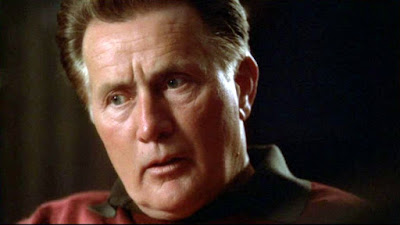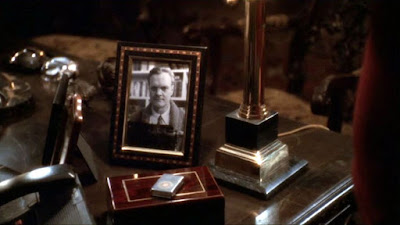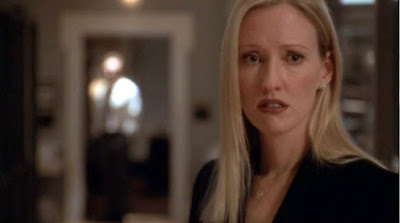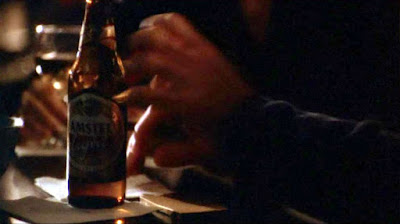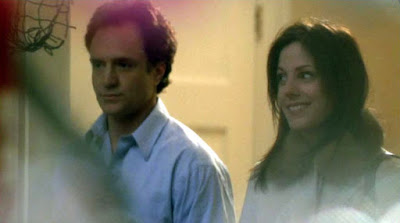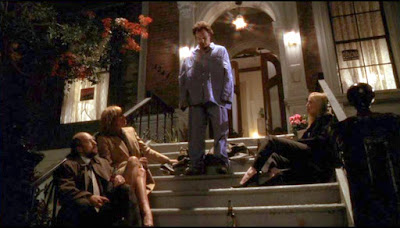Original airdate: February 6, 2002
Written by: Aaron Sorkin (57)
Directed by: Christopher Misiano (7)
Synopsis
- The President can't sleep. He turns to a psychiatrist to help, one we've already seen a year ago when Josh faced a personal crisis. Meanwhile, tempers flare over the wording of an upcoming foreign policy speech; Sam gets into hot water over comments he makes to Ainsley; CJ fights to help a reporter held hostage in the Congo; and Donna gets a job offer.
"Dr. Keyworth ... did you know anyone on the plane?"
The strain of being President, the "leader of the free world," must be almost unfathomable to everyday Americans. Taking the weight of national leadership upon your shoulders, the grave responsibility of decision and action, setting policy to guide the nation while remaining interconnected to the rest of the world - that's overwhelming on its face. Add to that the fallout of admitting a health coverup during your election campaign, which led to congressional hearings that cost your staff, family, and friends time, money, and emotional stress. And just to make things a bit more complicated, a trusted advisor has just called you out on how your fractured relationship with your late father is causing you to make safe decisions, rather than bold action. Would you be able to sleep under those circumstances?
Jed Bartlet sure can't. It's a Friday night, and he hasn't been able to sleep since the tense confrontation between him and Toby that we saw the previous Monday at the end of The Two Bartlets. In desperation, he turns to Dr. Stanley Keyworth - a man we saw help guide Josh through his psychic pain and turmoil in Noël.
Except Stanley doesn't know that's why he's been called. He thinks he's at the White House to meet with Josh again, as a follow-up - but he's puzzled by the constant references to his flight and whether or not he saw anyone he knew on the plane. Sam, Leo, even the driver who brought him from the airport, all of them asked that question. When the penny drops and Stanley realizes it's something else, well ...
Leo: "How was your flight?"
Stanley: "It was fine."
Leo: "Did you know anyone on the plane?"
Stanley (pause): "You ...didn't bring me here to talk to Josh, did you?"
Leo: "No."
Stanley: "Who did you bring me here to talk to?"And then a voice from the doorway behind him:
"Dr. Keyworth ... did you know anyone on the plane?"
It's a great reveal, and a nice setup throughout the cold open.
The session between the two evolves throughout the episode. Stanley - who as he says is a trauma specialist, not well-versed in sleep disorders - takes a logical approach to eliminating possible reasons why the President can't sleep. When Bartlet (rather knowingly) hits on the real issue - his confrontation with Toby - now the psychiatrist finds himself on familiar ground:
President: "Well, I guess we talked about a lot of things. Who we think the Republican challenger is gonna be, and incumbency and campaign strategy, strategic overview, but the long and short of it is, my father never liked me at all."
Stanley: "Well, at least we're closer to my area now."
President: "Yeah, I thought you'd enjoy that."As Stanley explores that "complicated" father-son relationship, he ends up at the exact same place as Toby did four nights before - Bartlet's need to earn his late father's approval has weakened his drive to make bold policy moves. Instead, having voters love him and winning elections have become Priority Number One for the President, and the stark difference between that and the President whose name is on Jed's bedroom is causing nearly unbearable stress on his psyche:
Not surprisingly, this angers the President, just as Toby's hitting on that same nerve did. "I'm not trying to get my father to like me," he retorts. Stanley responds with, "Good. Cause that's never, never gonna happen."Stanley: "I think Lincoln did what he thought was right, even though it meant losing half the country. I think you don't do what you think is right if it means losing Michigan's electoral votes."
And the President actually takes a moment for that to sink in, to realize yes, the doctor is right.
Unlike Stanley's meeting with Josh ("You're too easy a case for me") he's willing to continue meeting with the President, if Jed is ("Use me, don't use me ..."). After he leaves, Jed takes a moment to consider the battles inside his head - his irrational urge to get his dead father to love him, as well as the responsibility of the office passed on from those like Lincoln (and the cigarettes are a nice prop-related reference to that father-son struggle we saw in Two Cathedrals):
We don't end up with a solution at the end of the episode - it doesn't seem like Bartlet will find it much easier to sleep, at least not right away - but Jed is taking definite steps towards reconciling the battles going on in his head. At the very least, he's figured out what they are.
There's actually several interesting, meaty storylines here. The communications staff is finishing up a speech that President Bartlet intends to give at the United Nations, a speech outlining a tougher foreign policy by specifically calling out "the crushing yoke of Islamic fanaticism." A couple of things make this intriguing - naturally, the more open-minded, outward-looking liberal Democrats in Congress aren't thrilled at all with the President of their own party throwing down against Islam; and it's Toby - old-school protest-march dyed-in-the-wool liberal Toby - who's behind the most inflammatory language in the speech. For me, anyway, this stance always struck me as not "in-character" for Toby as we've come to know him. But, I suppose, it certainly does add depth and dimension to that character, and as I'll talk about later on, Aaron Sorkin decided that somebody on the staff needed to take up some kind of post-9/11 clash-of-cultures stand. There's a huge portion of the American viewing audience who have similar feelings now, five months after those devastating attacks ... and Sorkin settled on Toby as the guy to say that out loud on the show.
Also complicating matters is the fact that the strongest voice against the language in the speech is Rep. Andrea Wyatt - who also just happens to be Toby's ex-wife. This leads to a lot of hilarity among the other staff members:
Leo: "You know your wife's going to have something to say about it, though."
Toby: "My ex-wife."
Leo: "Yeah."
Toby: "Why do you call her my wife?"
Leo: "It bothers you."
Toby: "Everything bothers me."
Leo: "Yeah."
And then when Toby is leaving Leo's office after CJ comes in, she says to him, "Someone's gonna get an ass-kickin' from the missus," which causes Toby to turn back to the door in rage as it closes in his face:Toby: "But you pick that?"
Not to mention Sam calling Toby "baby." (Toby: "You probably want to rethink calling me 'baby,' right?")
But Andy is furious at Toby, and Sam, and anyone who had a hand in writing up this foreign policy position. Toby actually has some solid ground on which to stand, with specifics about why America shouldn't continue to reach out to the Arab world while getting its own hand bitten. When Andy presents an alternate version of the wording sent by members of her committee, he's not pleased with that, either:
Andy: "The speech isn't supposed to be about ideology. It's supposed to be about reality."
Toby: "I think the President will decide what the speech is supposed to be about, but the reality is, the United States of America no longer sucks up to reactionaries, and our staunch allies will know what we mean."
Andy: "We don't have any staunch allies in the Arab world, just reluctant ones. We've a coalition held together with duct tape! A coalition without which we cannot fight!"
Toby: "Nobody's blowing off the coalition, and that coalition will be plenty strong."
Andy: "Oh, when we win?"
Toby: "That's right."
Andy: "What's Egypt going to think? Or Pakistan?"
Toby: "That freedom and democracy are coming soon to a theatre near them, so get dressed."It's quite a divide, these opposing ways of thinking, but I do think Sorkin does a pretty good job of covering both sides in the discussion between Toby and Andy. In the end, Toby agrees to take another look at the softer language, so maybe the new Bartlet foreign policy won't be so obstinate after all.
And then there's Sam, apparently kind of a stand-in for Sorkin as a whipping boy for criticism of how Sorkin writes women. I've discussed this topic before (notably in The Crackpots And These Women) as Sorkin has taken many shots through the years over his portrayal of women, their attitudes, and how men view them. A lot of the criticism is warranted, some of it is not (I mean, look at CJ, one of the great characters in dramatic television history), but he just can't resist using his bully pulpit of a national TV show to respond to his detractors.
The topic here is sexual politics and how men and women relate to each other in the workplace. Sam has asked Ainsley to come in to help work out some details in the UN speech. She arrives from a Federalist Society event, wearing a rather fancy evening dress, which causes Sam to blurt, "Hayes, you could make a good dog break his leash." Overhearing that comment is a worker temporarily assigned to the Communications Office, Celia Walton, who later takes Sam to task for what she sees as inappropriate workplace behavior:
Celia: "It was rude, it was inappropriate, and it was offensive."
Sam: "What did I do?"
Celia: "You demeaned her."
Sam: "No, we're friends. It's a completely mature, you know ... besides, she started it."
Celia: "Whatever."
Sam: "Well ... okay." (He starts into his office, then stops, turns, and comes back out) "I wasn't demeaning her. I was complimenting her."
Celia: "She's an Associate White House Counsel and you're complimenting her on her sexuality?"
Sam: "She looked good in that dress I thought."Looking at this from the year 2020, I agree that a phrase like "you could make a good dog break his leash" isn't exactly appropriate workplace conversation, with perhaps a little leeway for good friends, but really, not in the workplace, fellas. Almost 20 years ago, attitudes were different, but starting to change for the better, and that's where Celia is ahead of her time. Sorkin tries to build a solid foundation to defend her point of view, but he ends up undercutting her totally and making her attitude stick out like a sore thumb when Ainsley basically tells her off:
Celia: "Isn't the point that Sam wouldn't have been able to find another way to be chummy with a woman who isn't sexually appealing?"
Ainsley: "He would be able to, but that isn't the point. The point is that sexual revolution tends to get in the way of actual revolution. Nonsense issues distract attention away from real ones: pay equity, child care, honest-to-God sexual harassment and in this case, a speech in front of the UN General Assembly. So, you (to Sam), 25 percent on the assessments for Category A. You (to Charlie) ... I don't know what your thing is. And you (turning to Celia), stop trying to take the fun out of my day. With that, I'm going to get a cupcake."
I mean, Celia has some good points, for crying out loud ... but Sorkin ends up dismissing them with Ainsley's speech. For Celia, the issue is men unable to see even strong, capable women as something more than their physical appearance. For Ainsley, guys complimenting her looks isn't demeaning at all, it's fun, and what right does Celia have to pour cold water on that? It's certainly a conversation worth having, and certainly would be written differently in 2020 than it was in 2002 ... but I'm not sure Sorkin ended up with the best grasp on the issue.
Then we have CJ involved in an attempt to free a reporter who's been captured by rebels in the Congo. The reporter's boss comes to CJ asking for help, and Leo gets involved as they start negotiations ... or, more precisely, haggling over the payment the rebels will get in return for releasing the American. It's a plotline designed to tug at heartstrings, with the reporter's wife talking about her (young) family with Donna, even as we see CJ get tough with the corrupt Congolese attache:
CJ: "This is a shakedown, so tell us how much money, and where does it go."
Loboko: "The Congolese government doesn't negotiate with murderers."
CJ: "The Congolese government is a myth."
Loboko (to Leo): "I can't talk to this woman."The story comes to a sad ending when Josh brings word that the reporter has been killed in an ambush. And this emotional moment ends up connecting with an earlier scene concerning Donna ...
The arc of Donna restlessly searching for more responsibility, more respect, and more importance in the jobs she's given is one of the longest arcs of the entire series. We haven't seen that much of it yet, perhaps a few comments here and there, but in this episode she gets an outside job offer. While having a drink and catching up with a friend from college, that friend reveals he's starting an internet company covering behind-the-scenes activities in Washington politics. And he wants her to come on board:
Donna: "Well, I...I'm...surprised and I'm flattered, but I'm, you know, not at all qualified."
Casey: "That's not true. You've been Josh Lyman's traffic cop. That's like an M.A. in power brokering. You know the Hill. You know every corner of the White House. You know every pressure point ten miles from the Potomac."
(He writes something down on a card and slides it to Donna)
Donna: "Is this your operating budget?"
Casey: "It's your starting salary."
So how does this connect with the reporter killed in Africa? Donna had been sitting with the reporter's wife while negotiations went on, and was standing in the hallway when CJ and the reporter's boss gave her the bad news. As the wife collapses on the floor in grief, Donna looks on sadly:
The camera view changes, and we see Donna's face ... and also Josh, at the other end of the hall, looking on:
Donna turns and sees Josh there, taking in the scene:
I think this is meant to tell us, and Donna, something. Sure, a neat job as Issues Director at a dot-com with a big salary sounds great ... but that means you're not in the middle of things in the White House, helping make life-and-death decisions, helping guide policies that affect countries around the world. You wouldn't be "in the room where it happens," so to speak. And also, it means not working with Josh. I really think both those elements come into play in Donna's mind right here, and I think this scene tells us without words what her answer to Casey Reed is going to be.
So, wow - a lot of meaningful, thought-provoking, serious storylines are covered in this episode. The question often remains, how deep can you really delve into issues in a 48-minute script, especially when it's divided between five different topics? I think in a lot of ways, episodic TV like this can be a starting point for us to think about things like appropriate workplace behavior and how men and women see each other, or how America should view Islam and the Arab world in the aftermath of 9/11, or even how a man's personal emotional history comes to bear in a position of national leadership. I think The West Wing, while perhaps not wrapping everything up in a final conclusion on topics like this, does a really good job of laying out different points of view to get us to think about where we stand, and where we ought to stand. Instead of telling us what to think (which I admit The West Wing can often do), sometimes the show just gives us different ways to think about things. And hopefully we'll be able to get to sleep afterwards.
Tales Of Interest!
- Timeline notes: This episode takes place the same week as The Two Bartlets (it's a Friday, and the President says he's been unable to sleep for four nights, since the night of the Iowa caucuses when he had his confrontation with Toby). Toby also says it's been two weeks since the State of the Union, which was portrayed two episodes ago in 100,000 Airplanes.
- To me, at least, it's really interesting to see the intrusion of real-world events into The West Wing. The September 11 attacks occurred just as the 2001-02 television season was about to begin, and there were probably eight or ten West Wing scripts for Season 3 already written or in process at that time. While Sorkin quickly threw together Isaac And Ishmael in an attempt to acknowledge the reality of how America was coping in the immediate aftermath, it was also made clear that the episode doesn't actually exist within the series' timeline and that there hasn't been any such cataclysmic event occurring in the West Wing universe. There hasn't been any explicit reference to American military action by the Bartlet administration, except for the rare instances like the attack on Syria responding to the shootdown of a plane with medical personnel (A Proportional Response), the attempt to rescue DEA personnel in Colombia (Bartlet's Third State Of The Union / The War At Home), or the standoff with coup leaders in Haiti seen at the end of Season 2. By this time, though, we're seeing scripts that were written in a post-9/11 real world, and there are references and attitudes that only make sense in that regard. I first noticed it in the State of the Union address in 100,000 Airplanes, almost in the background, as the President vowed to track down terrorists in their caves. Now Toby's anger at an Arab world that mostly is an adversary ("They'll like us when we win!") and the mention of America building a fighting "coalition" somewhere in the Middle East are glimpses of the real world and real American attitudes in a post-9/11 atmosphere.
- The West Wing almost always has interesting editing and cinematic direction. I talked about the real inventiveness of shots and composition in The Two Bartlets (directed by Alex Graves), and here Christopher Misiano brings out some cool ideas of his own. I particularly enjoyed the early scene when President Bartlet (in his study) clicks on the closed-circuit feed of CJ's press briefing:
As the President murmurs an answer to a question posed by a reporter ("When do we see copies?" "When we're done writing it."), the scene changes to the briefing room, but CJ is still only seen on the monitors:
And finally we change to a shot of CJ at the lectern, fully transporting the viewer from the President's study into the briefing room:
- Martin Sheen was nominated for an Outstanding Lead Actor in a Drama Series Emmy for this episode, but he would end up losing to Michael Chiklis (The Shield). Richard Schiff's performance here (along with Hartsfield's Landing) earned him his third consecutive Emmy nomination for Outstanding Supporting Actor in a Drama Series. Schiff won the Emmy in 2000 and lost to castmate Bradley Whitford in 2001 - he'd lose to another castmate this year, John Spencer.
Quotes
Keyworth: "I'm a trauma specialist."
President: "Yeah, we know you. You helped Josh out last year."
Keyworth: "Josh was shot."
President: "Me, too."
Keyworth: "Is that why you can't sleep?"
President: "How would I know?"
Keyworth: "That's a fair point."
-----
(Toby paces back and forth as Leo looks over the speech)
Leo: "Toby?"
Toby: "Yeah?"
Leo: "Pacing."
Toby: "Yeah."
Leo: "Okay, now the standing still is bothering me a little bit."
-----
Andy: "Where is he?"
Sam: "I don't know."
Andy: "You said that already."
Sam: "But, you asked me again and I still didn't know."
-----
Josh: "You can't be thinking about taking a job that may not be around a year from now?"
Donna: "This job may not be around a year from now."
Josh (considers that a moment): "He offered you money?"
Donna: "Yeah."
Josh: "Well, all I can offer you is a title bump."
Donna: "Like what?"
Josh: "Senior Assistant to the Deputy Chief of Staff for Strategic Planning."
Donna: "That's my title now."
Josh: "Then I can't offer you a title bump."
-----
Toby: "We do know what's right."
Andy: "This is why they hate us."
Toby: "There's a lot of reasons why they hate us. You know when they're gonna like us? When we win."
-----
Toby: "How about when we sent American soldiers to protect Saudi Arabia, and the Arab world told us we were desecrating their holy land? We'll ignore the fact that we were invited. How about two weeks ago, in the State of the Union when the President praised the Islamic people as faithful and hardworking only to be denounced in the Arab press as knowing nothing about Islam? But none of that is the point."
Andy: "What is the point?"
Toby: "I don't remember having to explain to Italians that our problem wasn't with them, but with Mussolini. Why does the U.S. have to take every Arab country out for an ice cream cone? They'll like us when we win!"
-----
Stanley: "We're done for the night."
President (taken aback): "What?"
Stanley: "We've been here for two hours. It was a double session. We're done for the night."
President: "Stanley, I hate to put it this way, but I'm me, and you're you, and we're done when I say we're done."
Stanley: "No. (beat) I think you could use some assistance right now, sir. Use me, don't use me, but all I can offer you is this: I'll be the only person in the world, other than your family, who doesn't care that you're the President. Our time is up."
Story threads, callbacks, and familiar faces (Hey, it's that guy!)
- Dr. Stanley Keyworth of the American Trauma Victims Association, played by Adam Arkin, returns. We saw him in the Season 2 Christmas episode (Noël) as he helped Josh work through his PTSD from being shot at Rosslyn.
- Ainsley Hayes is back! The wonderful Emily Procter hasn't been seen since Ways And Means, when she was setting up Donna and Cliff Calley on a date (and we know how that worked out).
- And Toby's wife - er, sorry, ex-wife - Representative Andy Wyatt (Kathleen York) appears for the third time. She was last seen in a short scene in Ellie.
- There's obvious callbacks to the Rosslyn shootings seen in In The Shadow Of Two Gunmen (when the President tells Dr. Keyworth he was shot, too) and Josh's visit with Stanley in Noël.
- The "complicated" relationship Jed had with his father - and his ongoing need to try to win his approval retroactively - was first explored in Two Cathedrals and then prodded at by Toby in The Two Bartlets.
- Charlie said his sister was named "Deena" in A Proportional Response. Here he calls her "Deanna."
- We see a photograph of Jed's father, whom we saw in Two Cathedrals (played by Lawrence O'Donnell).
- WHAT'S NEXT MOMENT - This isn't exactly a "What's next?" moment, but it's similar - at one point Stanley tells the President, "This is a hell of a curve you get graded on now. Lincoln freed the slaves and won the Civil War. 'Thank you. Next! And what will you be singing for us today, Mr. Bartlet?'"
DC location shots
- None
They Do Exist! It's The Real Person, or Thing
- Josh's tour of the White House for Stanley includes discussion of the Resolute desk, with references to President Rutherford Hayes and Queen Victoria.
- Josh also tells Stanley about White House architect James Hoban, President James Buchanan and Edward, Prince of Wales. Josh also mentions recently discovered receipts for money paid to slave owners whose slaves helped build the White House - the National Archives had just exhibited some of those documents a year prior to this episode airing.
- Leo talks about the soot stains from the British burning of the White House in 1814, as well as First Lady Dolley Madison.
- For the second episode in a row, former CNN anchor Bobbie Battista appears on a TV in the background. To be honest, this might be the exact same clip they used in The Two Bartlets.
- Ainsley tells Sam she left an event for the Federalist Society to come help him with the UN speech.
- Andy satirically wonders if the old-time comedy duo Abbott and Costello are behind the administration's foreign policy speech.
- We get a mention of the International Herald Tribune, which was a real newspaper (headquartered in Paris and jointly owned by the Washington Post and the New York Times) devoted to coverage of world events. Publishing under that name ended in 2013, and as of 2016 the paper is now called The New York Times International Edition.
- President Bartlet tells Stanley a joke involving playwright Arthur Miller, and mentions his play Death of a Salesman.
- Toby's rant against the Arab world for some reason brings in the World War II Italian dictator Benito Mussolini.
- Of course President Lincoln plays a large role at the end of the episode, with the weight of comparisons between him and President Bartlet.
- PRODUCT - Donna's friend Casey Reed is drinking Amstel Light at the bar. There were also fleeting glimpses of a couple of other liquor bottles, including what looks to be Johnny Walker Red scotch (what, they didn't have any Johnny Walker Blue left over from Bartlet For America?).
End credits freeze frame: The final shot of President Bartlet staring out the window of his study.




